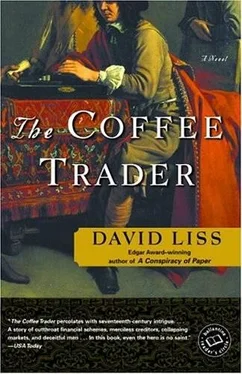“No,” Daniel answered, too quickly. “No, perhaps I shouldn’t interfere with your business. A man has a right to order his own affairs.”
“You are very kind.” Miguel had not meant for his words to sound quite so bitter.
“I only inquire into your business out of curiosity. Brotherly curiosity, you know. For example, I should love to learn more of this coffee trade you mentioned.”
Miguel felt the tingle of panic. “I told you, I have no such trade.”
“Let’s be open with each other. I’m certain it must be a safe topic within these walls.”
“I have no plans,” Miguel said as he walked away, “but if you think the coffee trade so promising, I’ll be certain to look into it.”
Miguel passed through the kitchen, where Hannah and Annetje busied themselves with moving carrots and leeks from this place to that in an effort to appear as though they had been tending to the meal and not listening at the door.
Once in his cellar, he struck a few candles and then ground some beans with the mortar and pestle he had not yet returned to the kitchen, and which had not yet been missed, and heated some wine. Only once he had poured the mixture into a bowl and allowed it to settle did he break open the letter from Joachim.
Senhor Lienzo,
When we spoke earlier, I may have grown unnecessarily heated. Nevertheless, I think you will agree that my anger is well justified and that you indeed owe me more than you have been willing to admit. Therefore, please accept my regrets. I wish you to know I am glad that we may enter into a matter of business that will serve our mutual interests. I remain your servant,
Joachim Waagenaar
He took a sip of his drink, though he might have been drinking beer for all he noticed the bitterness. Surely this man was far madder than Miguel had imagined. Had Joachim understood nothing of their conversation, even his own part?
After folding the letter and placing it upon the fire, Miguel went through the rest of his correspondence, which included more troubling lines from the Muscovy trader, who, it seemed, had taken to writing twice a day now. Miguel had not the heart to reply to these meddlesome words and, instead, took out his new pamphlet, but the tricks of Charming Pieter held no allure for him.
He set down the little volume when he heard footsteps upon the stairs. He thought he might have to face Annetje, whose silliness would only irritate him, but instead he saw that Hannah had descended halfway down to the cellar. She held a smoky candle in her hand, and she peered with seeming difficulty into the dimly lit room.
“Are you there, senhor?” she called softly.
Miguel could not think how to reply. Hannah had never before come into the cellar, and that she did so without knocking seemed to him unthinkable. He might have been undressed. He recalled that he had not closed the door, so perhaps Hannah believed that to be a sign of his willingness to receive guests. Such a mistake, he determined, must never again be permitted.
“I’m here, senhora.” He set down his bowl of coffee and moved toward the foot of the stairwell. “Do you require me?”
“I smelled something strange,” she told him, taking a few more steps down. “I wanted to make certain all was well.”
No odor, other than fire or vomit, ought to provoke such a response. The coffee was certainly the culprit. Since he had received the beans of Geertruid, Miguel had grown accustomed to the aroma but recognized that it might smell alien to someone unfamiliar with it.
“Oh, the floor is all wet,” Hannah observed. “Have you spilled something?”
“It is the canal, senhora. It floods at night.”
“I know,” she said quietly. “I worry that you’ll grow ill.”
“I do well enough, senhora. And it is better to sleep in the damp than in a heated room with no windows. I inquired of a physician.”
“I wanted to see about the odor.” She sounded confused, as though she had taken too much wine. Now that he thought about it, her voice did have a loose, unformed quality. She seemed to be making an effort to say something more, as though she could not bring herself to her topic. He knew she took undue pleasure in his company, that she loved to look upon him and make idle chatter with him, but to descend to the cellar-had she discovered some new boldness?
“There is no need to so trouble yourself, senhora. The smell is nothing but a new kind of tea. I am sorry it disturbed you.”
“A new kind of tea!” she nearly shouted, as though this had been what she had longed to hear. Miguel, however, did not quite believe it. It was more, he thought, as though she had latched onto some opportunity. Hannah now ventured another step, until she hovered only a few inches above the wet. “Daniel thinks tea a waste of money, but I love it.”
Miguel noticed that Hannah’s scarf had come askew and he could see a thick lock of her black hair dangling across her forehead. As a woman who had returned to Jewish ways only recently, she perhaps did not feel to the depth of her soul the force of the Law that prohibited a married woman from showing her hair to any man but her husband. Miguel had found the injunction strange when he had first arrived in Amsterdam, but he had absorbed its urgency to such a degree that he would hardly have been more shocked had she exposed to him her bare breasts-which were large and of significant interest to him.
As it was, he found this lock of hair strangely exciting. “Perhaps you might taste it someday,” Miguel said, in rapid words that betrayed his discomfort. His face grew hot, and his pulse quickened. His eyes fixed upon this lock of hair. In an instant, he knew what it must feel like to the touch-smooth and brittle at once-and he could smell its musty aroma. Did she know she so exposed herself? Miguel could hardly think so. He wanted to say something so she might undo the error before Daniel discovered it, but if he were to tell her that she had so disrobed herself, mortification might overwhelm her.
“I’ll be happy to share the tea with you some other time,” he told her. “I hope you will close the door to the room when you depart.”
Hannah could not mistake his meaning. “I am sorry to have bothered you, senhor.” She retreated up the stairs.
He thought to call out, to say she had not bothered him. He could not let her walk away feeling foolish. But he knew that was precisely what he ought to do. Let her feel foolish. Let her come down here no more. No good could come of it.
Miguel returned to his writing table and finished his drink. He would not allow himself to think about her, having trouble enough without letting thoughts of his brother’s wife confuse him. Better he should think of how to extract Joachim Waagenaar from his affairs.
Miguel stumbled upon no solutions though the problem kept him awake. Many hours after the household had fallen into quiet, he slipped up to the attic to awaken Annetje, and only after he had spent himself with her did he find any rest.
from
The Factual and Revealing Memoirs of Alonzo Alferonda
Since Miguel Lienzo developed an interest in the wondrous fruit, I had been meeting him in a little coffee tavern in the Plantage run by a Turk I called Mustafa. This may have been his true name or it may not; I have no way of knowing. It was the name of the Turk in a play I had seen once, and this fellow reminded me of that fictional Mohammedan. If he objected to my calling him by that name, he never told me so.
One afternoon when I met Lienzo I had been fortunate enough to be served a most unusual delicacy by Mustafa. I was sitting and enjoying the drink when Lienzo showed himself most eagerly. He had enlisted my aid in a matter of whale oil, and it had turned out rather well for him.
Читать дальше












